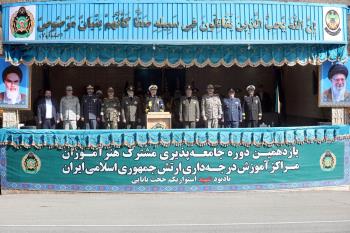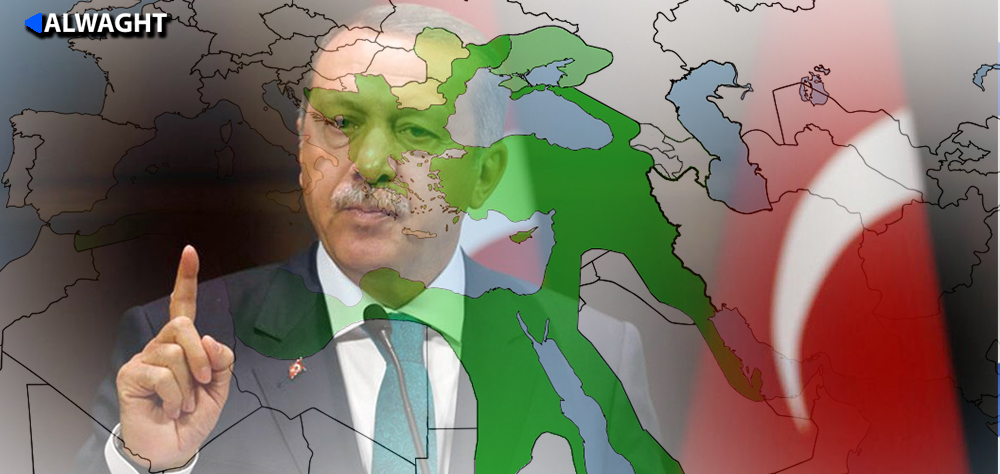Alwaght- After 2011, the Turkish government led by President Recep Tayyip Erdogan adopted an aggressive foreign policy marked by military campaigns in Syria, Iraq, and even Libya through Ankara-backed mercenaries, and then the massive intervention in Karabakh war last year. The Turkish government's new approach, dubbed neo-Ottomanism, seeks to restore the frontiers of the Ottoman Empire.
According to the "national covenant" adopted by the Ottoman Empire in 1920, in Iraq about 6 current provinces of Duhok, Erbil, Halabja, Sulaymaniyah, Mosul and Kirkuk, in Syria parts of Aleppo, Idlib, Raqqa and Deir ez-Zor provinces, parts of other neighbors, namely Bulgaria, Greece, Georgia, Armenia, the Azerbaijan and even Iran, including the cities of Mako and Chaldoran in the north of West Azerbaijan province, will be part of the new Turkish state— though the Treaty of Lausanne formed new Turkey with its current borders.
Although it is impossible to implement the national covenant with regard to the regional and international equations, over the past few years Ankara has embarked on an aggressive approach to occupy various areas in northern Syria, Iraq and even establish a strong presence in Libya. The presence in these occupied regions is apparently colonial, with Turkey building dominance over water and soil resources, identity, agriculture, and environment there. In addition to the policy of demographic change and land acquisition, Turkey's colonialist approach also includes control over nature.
Turkey seeking to loot Syrian identity, wealth
Turkey first occupied areas between Azaz and Jarablus in northern Aleppo province on December 24, 2016, as part of Operation Euphrates Shield. On January 20, 2018, the Turkish army occupied the canton of Afrin in northwestern Syria as part of Operation Olive Branch. In the third wave of its occupation, on October 9, 2019, the Turkish army launched Operation Peace Spring to occupy areas east of the Euphrates River. There is evidence that, throughout the occupied areas, Turkey is implementing a policy of demographic and identity change.
In Turkey's new colonialist approach, its affiliated mercenaries have sought to take ownership of agricultural lands. According to the Syrian Observatory for Human Rights, a British-based monitoring group, the Turkish-affiliated armed groups known as the Al-Hamza Brigade and the Al-Shamiya Front have recently launched heavy assaults on Astir and Afrin towns in northern Aleppo suburbs to seize lands from the Syrian farmers. In addition, local media reported that for the past two years, the Turkish government and its terrorist mercenaries have looted olive products and olive oil in and around the northern suburbs of Aleppo and shipped them to the US markets via Turkish state-owned companies. Even the Turkish daily Zaman confirmed that Turkish companies have agreed to export 90,000 tons of olive oil "as a Turkish product" to the US, which is essentially produced in Afrin farms.
This colonialist approach of Ankara comes at a time when all the evidence and reports suggest that over the past two years, Turkey and its mercenaries have transferred Kurdish women from Afrin to Libya as sex slaves for Ankara-backed militants. Also, after the occupation of Afrin in 2018, there were reports of human organs trafficking by the Turkish-backed militias. In addition, reports from human rights organizations indicate demographic change, deforestation, and organized efforts to change identity in the Syrian towns at the hands of Turkey and its aligned militias.
Turkish invasion of Iraqi nature, ecosystem
In addition to Syria, the colonialist approach of the Turkish army in the occupied areas of Iraq has recently been observed. Last year, Ankara carried out three military operations in northern Iraq under the pretext of fighting the Kurdistan Workers Party (PKK), a Turkish militant organization blacklisted by Ankara. On June 15, 2020, Turkey launched Operation Eagle Claw by sending its commandos to the Haftanin region in northern Iraq. On June 17, 2020, it launched Operation Tiger Claw, and in the third operation, on April 23, 2021, Turkey launched an attack on the mountains of Erbil province under Operation Lighting Claw and Thunder Claw.
Recently, evidence suggests that the Turkish military has put on the agenda mass cutting of trees in the occupied areas of Iraq, which is unprecedented in the history of modern day world. Bigard Talabani, agriculture and water resources minister of the Kurdish Regional Government (KRG), and his central government counterpart Karim al-Khafaji strongly protested the Turkish actions. In a statement, Iraqi officials condemned the Turkish military's actions "uncivilized, a sign of hostility to Iraq's nature and environment, and a crime against the region's environment."
Libya, new theater to the Turkish colonialist actions
In addition to Syria and Iraq, Turkish actions in Libya have caught the attention of political observers as a new aspect of colonialism. The basis of Turkey's colonialist approach in Libya is on the fact that Ankara has a large share of the existing contracts and privileges in Libya in the field of energy, economy and development with a reliance on direct military presence. Over the past years, Ankara facilitated presence of Turkish companies in Libya through signing various contracts with Tripoli-based government.
Here are how Turkish colonialist approach is showing itself:
Most importantly, in the past two years, Erdogan claimed that it is only Turkey that can explore the huge gas reserves of the Mediterranean. In making these claims, Erdogan refered to the pacts signed with Libya time's Prime Minister Fayez al-Sarraj in Tripoli. The agreement drew strong opposition from the coastal states. Erdogan said, according to the agreement with Libya, Turkey can drill in the waters of Libya to explore oil and gas, and this does not violate the international law. The core point of the Turkish government's argument is that other actors can no longer conduct drilling and exploration operations in the region. Specifically, the Greek part of Cyprus, Egypt, Israel and Greece are not allowed to build a gas pipeline from the region without obtaining permission from Turkey.
Additionally, last year, Turkey finalized a $16 billion worth of economic agreement with the Libyan government, according to which Turkish companies would complete Libya’s construction projects that halted because of the war. This is part of the Ankara-Tripoli cooperation to complete 184 construction megaprojects. It looks like Erdogan has his eyes on $67 billion Gaddafi-era Libyan blocked money.
Over the past year, the Turkish leader more than once highlighted Ankara's power and determination to seize Libyan oil-rich areas, in addition to dominance over the gas resources in the Mediterranean. This leads the observers to the notion that Erdogan's Turkey has clear-cut and ambitious plans to dominate Libyan oilfields.



























